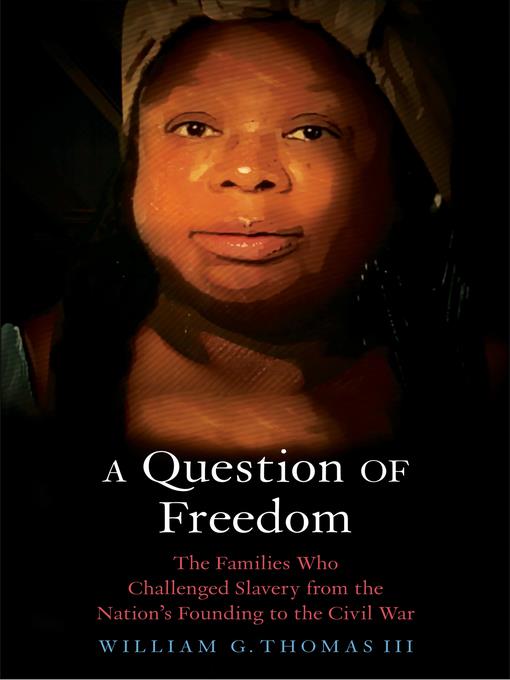
A Question of Freedom
The Families Who Challenged Slavery from the Nation's Founding to the Civil War
کتاب های مرتبط
- اطلاعات
- نقد و بررسی
- دیدگاه کاربران
نقد و بررسی

Starred review from September 21, 2020
Thomas, a history professor at the University of Nebraska, debuts with a revelatory and fluidly written chronicle of attempts by enslaved families in Prince George’s County, Md., to win their freedom through the courts. Many of these men and women were held at the Jesuit-owned White Marsh tobacco plantation, and profits derived from their labor—or from their sale to slaveholders in the deep South—helped to finance Georgetown University. In 1791, two men enslaved at White Marsh sued the Jesuits for their freedom, basing their argument on claims that they were descended from free women of color. Their lawsuits “opened the floodgates,” Thomas writes, leading to “more than a thousand legal actions against hundreds of slaveholding families” in the county. He convincingly characterizes these “freedom suits” as “a public counterpart of the Underground Railroad” that forced a reckoning with the patchwork of laws supporting slavery. Moving profiles of Edward Queen, one of the original litigants, and Thomas Butler, whose family won their freedom suit against Supreme Court justice Gabriel Duvall, reclaim the humanity of slavery’s victims, and Thomas’s discovery that his own ancestors held Queen’s relatives in bondage adds emotional and historical nuance. The result is an essential account of an overlooked chapter in the history of American slavery. Agent: Wendy Strothman, Strothman Literary.

November 1, 2020
The literature of American slavery is filled with accounts of people who sought emancipation through escape and insurrection. Thomas (history, Univ. of Nebraska) demonstrates that many enslaved people were able to use the legal system to escape from bondage. Drawing heavily from court records in and around Prince George's County, MD, Thomas closely follows the story of the Edward Queen and related families who built a successful record of freedom suits by demonstrating hereditary descent from a free ancestor. The author traces how the freedom suits led to changes in judicial procedure and new legislation that led to the gradual erosion of the legal rights of African Americans and their further dehumanization within the law. He also looks at the role of the Catholic Church as a corporate slave owner, arguing that the freedom suits were often a contributing factor in the decision by the church to sell enslaved people (the sale of 272 people by Georgetown University in 1838 is the most prominent example). VERDICT This detailed and meticulously-researched account is an important contribution to the history of American slavery. Recommended primarily for readers interested in the legal history of slavery and in stories of enslaved people who directly challenged the legality of slavery in the United States.--Nicholas Graham, Univ. of North Carolina, Chapel Hill
Copyright 2020 Library Journal, LLC Used with permission.

Starred review from September 15, 2020
A history of slaves who sought legal redress to obtain emancipation. For historian and Guggenheim fellow Thomas, investigating suits brought by slaves against slaveholders from America's founding through the end of the Civil War had more than academic interest: His own ancestors, he was shocked to discover, included slave owners in Maryland and a lawyer who staunchly defended slave owners' interests. Interwoven with his compelling historical narrative, the author recounts conferences, meetings, and his attendance at the Summer Institute for Reconciliation at Duke Divinity School, where he met descendants of slaves, pastors, community organizers, and others to examine the reality and consequences of racism. Drawing on long-buried archival material--depositions, lawyers' notes, fragmentary case files--Thomas fulfills his goal of chronicling the lawsuits and vividly bringing to light the lives and experiences of the individuals involved, particularly the Queen family, which sought freedom from bondage, and his own, the slaveholding Ducketts. The freedom suits, writes the author "were, in effect, a public counterpart of the Underground Railroad," enacted across the country, in every court available--even up to the Supreme Court, which heard an appeal in 1813. Many of the suits were against the Jesuits, who, by 1767, "owned more slaves than any other person or organization in the Western Hemisphere." They predominated in the American Colonies, where Jesuit priests were major tobacco planters. In Maryland, enslaved families won hundreds of freedom suits; some who were emancipated were able to liberate other family members, and some were able to acquire property. But winning a suit did not necessarily mean liberation for all; for some, "freedom did not sever ties as much as strain, twist, and bend them into new configurations." Thomas reveals the deep-seated contradictions inherent in the slaveholding culture. Francis Scott Key, for example, a lawyer who represented more than 100 enslaved families, "also bought slaves and married into one of the largest slaveholding families in Maryland." A fresh, disquieting look into America's traumatic past.
COPYRIGHT(2020) Kirkus Reviews, ALL RIGHTS RESERVED.

























دیدگاه کاربران